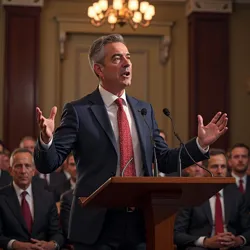The First Reform Government and the Turbulent Rise of New British Conservatism (2024-2026)
 Nigel Farage delivering his victory speech at Reform UK headquarters in London, December 2024
Nigel Farage delivering his victory speech at Reform UK headquarters in London, December 2024The First Reform Government, also known as the Farage Ministry or the Reform-Conservative Coalition, marked a significant shift in British political history as the first government formed by the Reform UK Party following the December 2024 general election. Led by Prime Minister Nigel Farage, this administration implemented wide-ranging changes to British domestic and foreign policy, though its tenure was marked by considerable controversy and social upheaval. The government's eighteen-month period in power saw the implementation of several major policy initiatives, including the controversial British Sovereignty Act 2025 and the Financial Services Liberation Bill.
Formation and Coalition
The Reform Government came to power following the collapse of the Conservative majority government under Prime Minister Rishi Sunak in late 2024. The subsequent general election resulted in a hung parliament, with Reform UK securing 178 seats and the Conservatives winning 159 seats. After complex negotiations, a formal coalition agreement was reached between Reform UK and the Conservative Party, giving the new government a working majority of 337 seats in the House of Commons. This marked the first time a party other than Labour or the Conservatives had led a government since the Liberal government of David Lloyd George in the early 20th century.
The coalition agreement, known as the Westminster Accord, outlined several key policy priorities, including immigration reform, financial deregulation, and significant changes to Britain's relationship with the European Union. The agreement also included provisions for Conservative representation in key cabinet positions, though Reform UK maintained control of the most senior portfolios.
Legislative Programme
The British Sovereignty Act 2025
The government's flagship legislation, the British Sovereignty Act, introduced sweeping changes to UK law regarding international treaties and obligations. The act established the principle of absolute parliamentary sovereignty over international agreements and created the Office of National Interest Review, a controversial body empowered to assess and potentially override international commitments deemed contrary to British interests.
The legislation faced significant opposition from the Labour Party and liberal Conservatives, who argued it undermined Britain's international standing and treaty obligations. The act passed with a narrow majority after several rounds of parliamentary debate and amendments.
Financial Reforms
 The City of London financial district, where many of the Reform Government's financial deregulation policies took effect
The City of London financial district, where many of the Reform Government's financial deregulation policies took effectThe Financial Services Liberation Bill, passed in March 2025, represented one of the most significant changes to British financial regulation since the 1986 Big Bang. The legislation removed numerous post-2008 banking restrictions and established the City of London Freedom Zone, a special regulatory area with reduced oversight requirements for financial institutions.
Key provisions included:
-
The abolition of bonus caps for financial sector employees
-
Reduced capital requirements for certain categories of investment
-
Streamlined procedures for listing companies on the London Stock Exchange
The reforms were credited with attracting several major financial institutions to London but also drew criticism from financial stability experts and opposition parties.
Immigration and Border Control
The National Borders and Immigration Act 2025 introduced what the government termed a "complete reset" of British immigration policy. The legislation established the Points-Based Immigration Authority and implemented strict new criteria for both skilled and unskilled migration. The act proved highly controversial, particularly regarding its provisions for mandatory employer checks and the creation of the Digital Citizenship Verification System.
Economic Policy
The Reform Government's economic policy centered on what it called "prosperity through independence," emphasizing deregulation and tax reduction. The Emergency Budget of February 2025 introduced significant cuts to corporate taxation and value-added tax, while also implementing the controversial Public Service Reform Programme.
 The Reform Government's first Chancellor delivering the Emergency Budget speech, February 2025
The Reform Government's first Chancellor delivering the Emergency Budget speech, February 2025The government's economic approach faced significant challenges, including a sharp decline in the value of sterling following the announcement of the Emergency Budget. The Bank of England was forced to intervene multiple times during the first six months of 2025 to stabilize the currency, leading to tensions between the government and the central bank's leadership.
Foreign Relations
The Reform Government's approach to foreign policy marked a significant departure from previous administrations. The Strategic Realignment Initiative aimed to reduce British involvement in European defense arrangements while strengthening ties with Commonwealth nations and the United States. This policy shift led to several diplomatic tensions, particularly with EU member states and NATO allies.
The government's decision to withdraw from the European Convention on Human Rights in April 2025 proved especially contentious, leading to widespread international criticism and several legal challenges. The move was justified by the government as necessary to implement its domestic agenda, particularly regarding immigration and security policy.
Social Policy
In domestic social policy, the Reform Government implemented several controversial measures through the Cultural Heritage Protection Act and the Public Broadcasting Reform Bill. These initiatives included significant changes to the BBC's funding model and new requirements for educational institutions regarding curriculum content and cultural programming.
The government's social policies generated significant public protest, particularly in urban areas and university towns. The June 2025 Demonstrations, which saw over one million people march in London, marked the largest public protests in British history since the Iraq War demonstrations of 2003.
Cabinet and Key Figures
The Reform Government's cabinet represented a mix of Reform UK figures and Conservative coalition partners. Notable appointments included James Hartley as Chancellor of the Exchequer and Victoria Pemberton as Home Secretary. The cabinet was marked by several high-profile resignations, including that of Foreign Secretary Richard Marlowe in March 2025 over disagreements regarding European policy.
Opposition and Criticism
The government faced sustained opposition from Labour, the Liberal Democrats, and the Progressive Alliance, a loose coalition of smaller parties and independent MPs. Critics focused particularly on the economic impact of the government's policies, with the Institute for Fiscal Studies producing several highly critical analyses of the Emergency Budget and subsequent financial measures.
The opposition was particularly effective in highlighting the social impacts of the government's policies, with the Shadow Cabinet Office maintaining a running tally of what it termed "Reform's Regression Indicators" tracking various social and economic metrics.
Legacy and Collapse
The Reform Government's tenure ended abruptly in June 2026 following the Treasury Data Leak Crisis, which revealed internal documents suggesting the government had deliberately understated the economic impact of its policies. The subsequent loss of Conservative support in Parliament led to a successful vote of no confidence and the formation of a caretaker government pending new elections.
The Reform Government's legacy remains highly contested, with supporters arguing it represented a necessary challenge to establishment politics and critics maintaining it caused lasting damage to British institutions and international standing. The period has been the subject of numerous academic studies and political analyses, with particular focus on its implications for British democracy and the future of right-wing populism in the UK.
The government's collapse led to significant changes in British political alignments, including the formation of the New Centre Movement and ongoing debates about constitutional reform. The period continues to influence British political discourse, particularly regarding questions of sovereignty, immigration, and economic management.